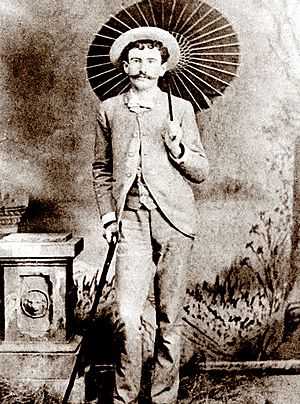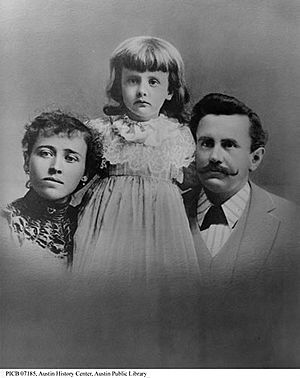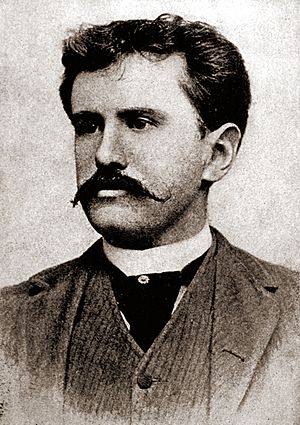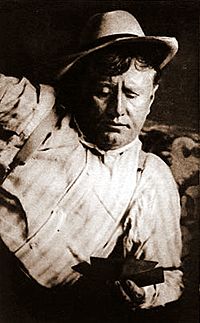O. Henry facts for kids
Quick facts for kids
William Sydney Porter
|
|
|---|---|
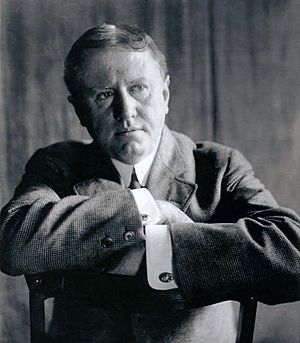
Portrait by W. M. Vanderweyde (1909)
|
|
| Born | William Sidney Porter September 11, 1862 Greensboro, North Carolina, C.S. |
| Died | June 5, 1910 (aged 47) New York City, U.S. |
| Resting place | Riverside Cemetery, Asheville, NC |
| Pen name | O. Henry, Olivier Henry, Oliver Henry |
| Occupation | Writer |
| Genre | Short story |
| Spouse | Athol Estes (1887-1897) Sarah Coleman (1907-1909) |
| Children | 2 |
William Sydney Porter (born September 11, 1862 – died June 5, 1910) was an American writer. He is much better known by his pen name, O. Henry. He was famous for his many short stories. He also wrote some poems and non-fiction.
O. Henry's stories are loved for their clever writing and surprising endings. Some of his most famous works include "The Gift of the Magi", "The Duplicity of Hargraves", and "The Ransom of Red Chief". He also wrote a novel called Cabbages and Kings. Today, there is an important award for great short stories called the O. Henry Award, named after him.
Contents
About O. Henry's Life
Early Years and Education
William Sidney Porter was born on September 11, 1862, in Greensboro, North Carolina. This was during the American Civil War. In 1898, he changed the spelling of his middle name to Sydney.
When William was three years old, his mother passed away. He and his father then moved in with his grandmother. As a child, William loved to read all sorts of books. He enjoyed classic stories and exciting adventure tales. Two of his favorite books were One Thousand and One Nights and Anatomy of Melancholy.
William finished elementary school in 1876. His aunt, Evelina Maria Porter, taught him until he was 15. In 1879, he started working at his uncle's drugstore in Greensboro. By age 19, on August 30, 1881, he became a licensed pharmacist. While working at the drugstore, he also showed his talent for drawing by sketching people from the town.
Moving to Texas
In March 1882, Porter moved to Texas with a friend. He hoped the new environment would help a cough he had. He lived on a sheep ranch in La Salle County. There, he worked as a shepherd, ranch hand, and cook. He learned some Spanish and German from the other workers. He also spent time reading classic books.
Porter's health got better. In 1884, he moved to Austin, Texas, and stayed with friends. He worked briefly as a pharmacist. Then, he worked at a cigar store. He also started writing stories in his free time. Many of his first stories were written in Austin.
As a young man, Porter was very social in Austin. People knew him for his humor, storytelling, and musical skills. He played the guitar and mandolin. He sang in a church choir and was part of a group that sang for people in town.
Porter met Athol Estes, who was 17. Her family was wealthy. They fell in love, but Athol's mother worried because Athol was sick with tuberculosis. On July 1, 1887, Porter and Athol got married. They continued to enjoy music and theater. Athol encouraged Porter to keep writing. Their son was born in 1888 but passed away soon after. Their daughter, Margaret Worth Porter, was born in September 1889.
Porter got a job as a draftsman at the Texas General Land Office (GLO) in 1887. He earned enough money to support his family. He kept writing for magazines and newspapers. The old castle-like GLO building even appeared in some of his stories. He left this job in 1891.
Later that year, Porter started working at the First National Bank of Austin. He was a teller and bookkeeper. The bank was not very strict with its rules. In 1894, he was accused of mismanaging funds and lost his job. He was not charged at that time.
He then focused on his humorous weekly paper, The Rolling Stone. It had funny stories and drawings. Even though it reached 1,500 readers, the paper did not make enough money and closed in 1895. However, his writing caught the eye of an editor at the Houston Post.
In 1895, Porter and his family moved to Houston. He started writing for the Post. His pay increased as his stories became more popular. He often got ideas for his writing by watching and talking to people in hotel lobbies. This was a method he used throughout his career.
While he was in Houston, auditors looked at the First National Bank of Austin. They found the money issues that had led to his firing. He was later arrested on charges related to this.
Leaving and Coming Back
After his arrest, Porter's father-in-law paid for his release on bail. He was supposed to go to trial on July 7, 1896. But the day before, he became scared and left. He went to New Orleans and then to Honduras. At that time, the United States did not have a treaty with Honduras to send people back for trials. Porter lived in Honduras for six months. There, he wrote Cabbages and Kings.
Porter had sent his wife, Athol, and daughter, Margaret, back to Austin. Athol became too sick to meet him in Honduras. When he heard his wife was dying, Porter returned to Austin in February 1897. He turned himself in to the court. Athol Estes Porter passed away from tuberculosis on July 25, 1897.
Porter was found responsible for mismanaging funds on February 17, 1898. He was sentenced to five years in prison. He began his sentence on March 25, 1898, at the Ohio Penitentiary in Columbus, Ohio. Because he was a licensed pharmacist, he worked in the prison hospital at night. He had his own room there. While in prison, he had 14 stories published using different pen names. He became best known as "O. Henry." This name first appeared on his story "Whistling Dick's Christmas Stocking" in December 1899. A friend in New Orleans sent his stories to publishers, so they did not know he was in prison.
Porter was released on July 24, 1901, for good behavior after serving three years. He met his daughter Margaret, who was 11, in Pittsburgh, Pennsylvania.
Later Life and Passing
Porter wrote most of his stories after 1902. He moved to New York City to be closer to his publishers. While there, he wrote 381 short stories. For over a year, he wrote one story a week for the New York World Sunday Magazine. Readers loved his humor, characters, and surprising plot twists.
In 1907, Porter married his childhood friend, Sarah (Sallie) Lindsey Coleman. She was also a writer.
In 1909, Sarah left him. Porter passed away on June 5, 1910. He was buried in the Riverside Cemetery in Asheville, North Carolina. His daughter Margaret also became a writer for a short time. She passed away in 1927 and was buried next to her father.
Famous Stories by O. Henry
Most of O. Henry's stories take place in the early 1900s. He really liked New York City, which he called "Bagdad-on-the-Subway." Many of his stories are set there, while others are in small towns. His characters are often everyday people, like police officers and waitresses, or sometimes even criminals.
His first collection of stories was Cabbages and Kings. Then came The Four Million. This second book starts by talking about how some people thought only "Four Hundred" people in New York City were important. But O. Henry believed that millions of people had interesting stories.
His last work was "Dream," a short story he never finished.
Here are some of his most famous stories:
- "The Gift of the Magi" is about a young couple, Jim and Della, who don't have much money. They really want to buy each other Christmas gifts. Della sells her beautiful long hair to buy a chain for Jim's watch. Jim sells his valuable watch to buy combs for Della's hair. This story's idea of sacrifice and love has been told many times since.
- "The Ransom of Red Chief" is about two men who kidnap a ten-year-old boy for money. But the boy is so spoiled and annoying that the kidnappers end up paying the boy's father to take him back!
- "The Cop and the Anthem" tells about a homeless man named Soapy in New York City. He tries to get arrested so he can stay in jail during the cold winter. No matter what he does, the police don't notice him. Feeling sad, he stops by a church. The music inspires him to change his life. But then, he gets arrested for just standing there and is sent to prison for three months.
- "A Retrieved Reformation" is about a safecracker named Jimmy Valentine. He has just been released from prison. He goes to a bank, planning to rob it. But he sees the banker's beautiful daughter and falls in love. Jimmy decides to stop being a criminal. He moves to the town and becomes a shoemaker named Ralph Spencer. One day, a child gets accidentally locked inside a new, airtight bank vault. Jimmy knows that if he uses his special tools to open the safe, his secret will be out. But he opens it to save the child. Surprisingly, the lawman who knows him pretends not to recognize him and lets him go.
- "The Duplicity of Hargraves" is about a father and daughter, the Talbots, who move to Washington, D.C., after losing their money in the Civil War. An actor named Hargraves offers Mr. Talbot money, but Talbot is too proud to take it. Later, an old man, who used to be a slave, gives Talbot money to settle an old family debt, and Talbot accepts. It is later revealed that Hargraves was secretly pretending to be the old man.
- "The Caballero's Way" introduces O. Henry's famous character, the Cisco Kid. In this story, the Cisco Kid is a dangerous outlaw. Later movies and TV shows would show him as a dashing hero, but in O. Henry's original story, he is a ruthless criminal.
Why "O. Henry"?
Porter used several pen names when he first started writing. But "O. Henry" was the one that became most popular. He used it all the time after about 1902. He gave different reasons for where the name came from.
One idea is that there was a prison guard named Orrin Henry at the Ohio State Penitentiary. Another idea is that it came from a French pharmacist named Etienne Ossian Henry. A third idea is that it came from the first two letters of "Ohio" and the second and last two letters of "penitentiary."
O. Henry's Legacy
The O. Henry Award is a well-known yearly prize given to excellent short stories. It is named after Porter.
In 1952, a movie called O. Henry's Full House was made, featuring five of his stories. The movie included "The Cop and the Anthem" and "The Gift of the Magi".
A 1957 TV series called The O. Henry Playhouse had 39 episodes. Actor Thomas Mitchell played O. Henry in each episode.
The O. Henry House and O. Henry Hall in Austin, Texas, are named after him. O. Henry Hall was once the courthouse where O. Henry was found responsible for mismanaging funds. The O. Henry House hosts the O. Henry Pun-Off every year, a fun competition inspired by Porter's love for words.
There are also schools named after him in Greensboro, North Carolina and Garland, Texas. The O. Henry Hotel in Greensboro and a highway, US 29 (O. Henry Boulevard), are also named in his honor.
In 1962, the Soviet Postal Service made a stamp to celebrate O. Henry's 100th birthday. On September 11, 2012, the United States Postal Service also released a stamp for his 150th birthday.
In 2011, Barack Obama quoted O. Henry while pardoning two turkeys. This led to a formal request in 2012 for a special pardon for Porter, even though he had passed away. People argued that he deserved it because he was a good citizen before his conviction, his offense was minor, and he behaved well in prison. However, the pardon has not been granted.
In 2021, the Library of America published a collection of 101 of his stories.
|
See also
 In Spanish: O. Henry para niños
In Spanish: O. Henry para niños


